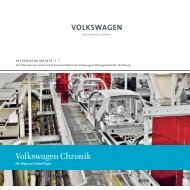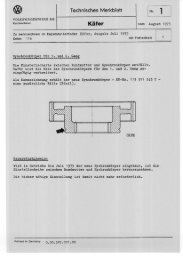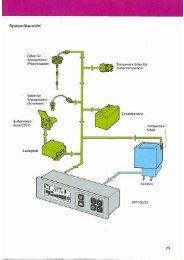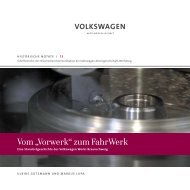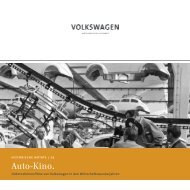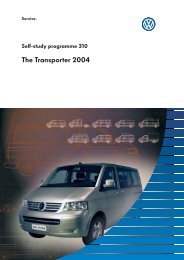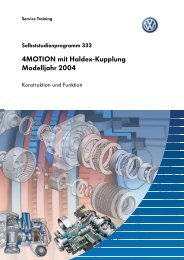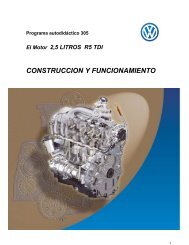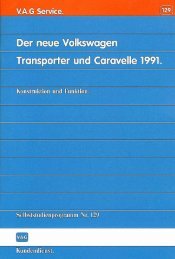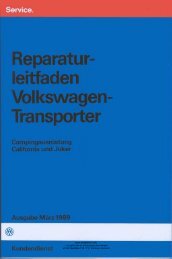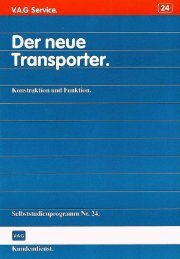HN 2: The British and their Works
HN 2: The British and their Works
HN 2: The British and their Works
You also want an ePaper? Increase the reach of your titles
YUMPU automatically turns print PDFs into web optimized ePapers that Google loves.
In mid-June 1948, general manager Nordhoff complained to<br />
the Industry Administration in Frankfurt concerning the inadequate<br />
provision of materials. He said that the head of<br />
the vehicles construction department had promised to increase<br />
the quota weight per vehicle from 850 to 1,000 kilograms.<br />
Furthermore the allocation of components in no way satisfied<br />
requirements, prompting the general manager to condemn the<br />
current regulation as inadequate. Fritz Wenk made it clear in<br />
self-defence that he had tried to get a fifteen per cent increase<br />
in the quota weight from the special department of economic<br />
planning. However that department did not wish to adopt any<br />
new regulations in view of the immediately forthcoming<br />
currency reform. This was also the reason why the Volkswagenwerk<br />
was being bombarded with "Bezugsscheinen"<br />
(supply permits), because all the customers were pressing for<br />
delivery of a car before the currency change. Because the<br />
Volkswagenwerk could not meet these dem<strong>and</strong>s, it was open to<br />
the accusation of deliberately withholding the vehicles.<br />
Incensed at this, Nordhoff informed the Industry Administration<br />
that he was seriously considering "stopping deliveries<br />
altogether, exactly as all the suppliers are doing to us". 203<br />
<strong>The</strong> stagnation <strong>and</strong> contraction of the markets in the months<br />
prior to the currency reform gave the general manager little<br />
cause for optimism. Indeed it was with some concern that he<br />
viewed the long-term security of the company. <strong>The</strong> Industry<br />
Division’s deliberations concerning a transfer of the Volkswagenwerk<br />
to Ford <strong>and</strong> concentration on the Cologne Ford<br />
works’ car production in Wolfsburg therefore met with his<br />
agreement. In this way Nordhoff believed he could procure the<br />
necessary capital reserves <strong>and</strong> forge ahead with technical<br />
modernisation of the factory. Amalgamation with Ford furthermore<br />
looked like a good thing from the point of view of eliminating<br />
the export trade restrictions, especially price fixing. <strong>The</strong><br />
American car manufacturer was receptive to these plans <strong>and</strong><br />
had expressed its interest in a takeover after viewing the<br />
Volkswagen plant in March 1948. <strong>The</strong>y regarded the saloon as a<br />
unique vehicle which, with some improvements in design,<br />
materials <strong>and</strong> fabrication, had a brilliant future ahead of it. In<br />
the same month Henry Ford II, during his first tour of Europe,<br />
held exploratory talks with the VW general manager.<br />
<strong>The</strong> initiative finally came from Nordhoff, who in April 1948<br />
sent Ford a letter dealing with the question of a takeover.<br />
<strong>The</strong> American automotive giant decided to acquire a large, but<br />
minority, interest in the Volkswagenwerk in order to prevent<br />
unpleasant reactions to a foreign takeover. In the Volkswagenwerk<br />
Board of Control the planned merger had a mixed<br />
reception. <strong>The</strong> Industry Division welcomed the proposal as a way<br />
of improving the capacity utilisation of the factory <strong>and</strong> bringing<br />
a breath of fresh air into the management. In the meantime the<br />
Property Control Branch envisaged a transformation into a<br />
public company, <strong>and</strong> refused to discuss the possibility of a<br />
private sale. Its veto may well have contributed to preventing<br />
the marriage of the two carmakers. While Nordhoff <strong>and</strong><br />
Radclyffe stuck to the merger plans, in October 1948 Ford retreated<br />
a step, because the unclarified ownership question <strong>and</strong><br />
the financing of the deal were meanwhile developing into<br />
insurmountable problems. After the Berlin blockade of 1948/49,<br />
the Ford Company put its European expansion plans on ice for<br />
the time being. 204



